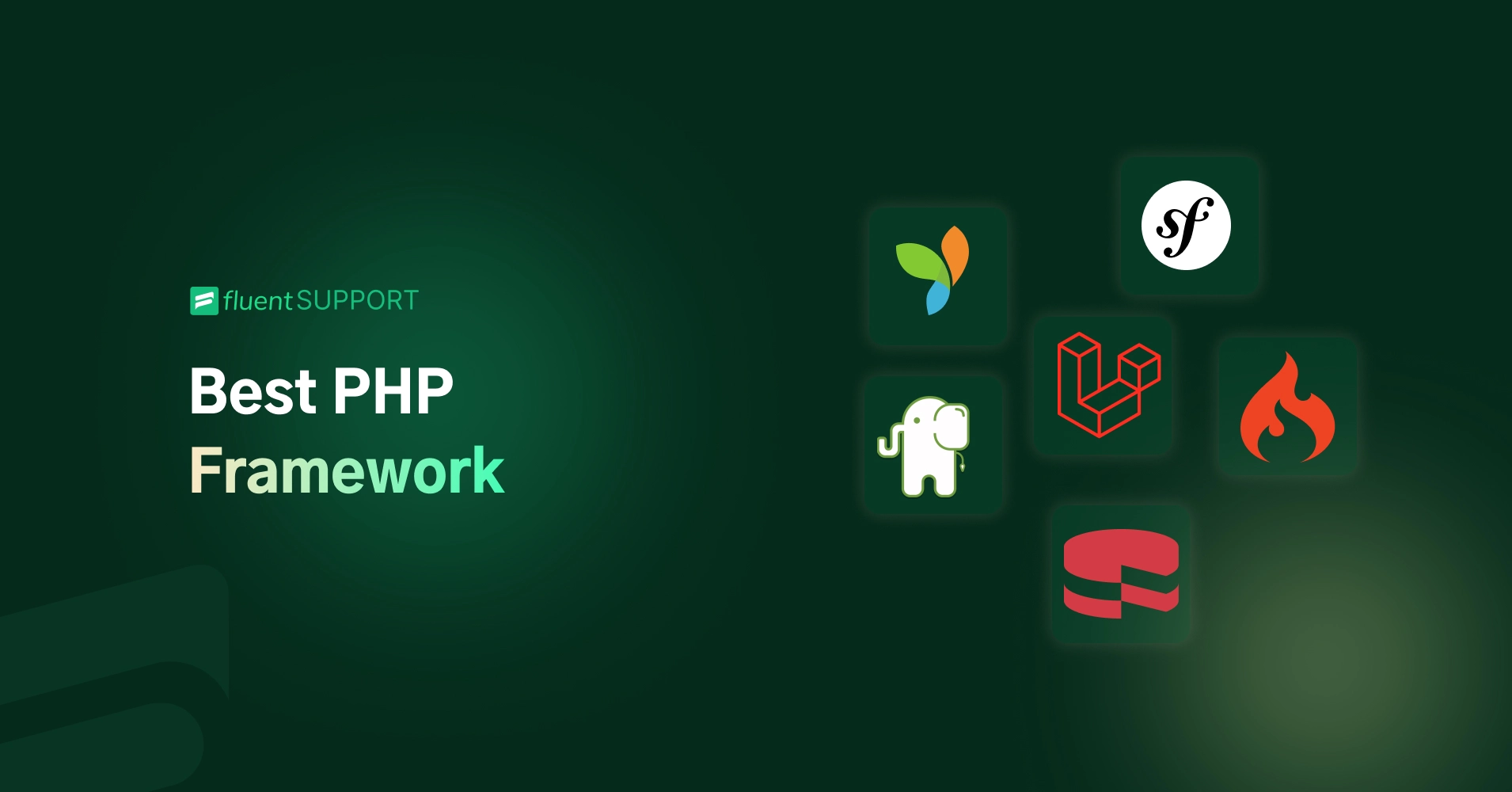
5 Best PHP Frameworks For Web Developers
By Md. Ariful Basher
July 8, 2024
Last Modified: July 9, 2024
Before 2012, PHP was the number one language for web development. Now Javascript is holding the best position. However, in the developer community, PHP still holds prominence because of its dominance in CMS, server-side scripting, and widespread hosting support. Most importantly, it provides a dynamic ecosystem with the best PHP frameworks.
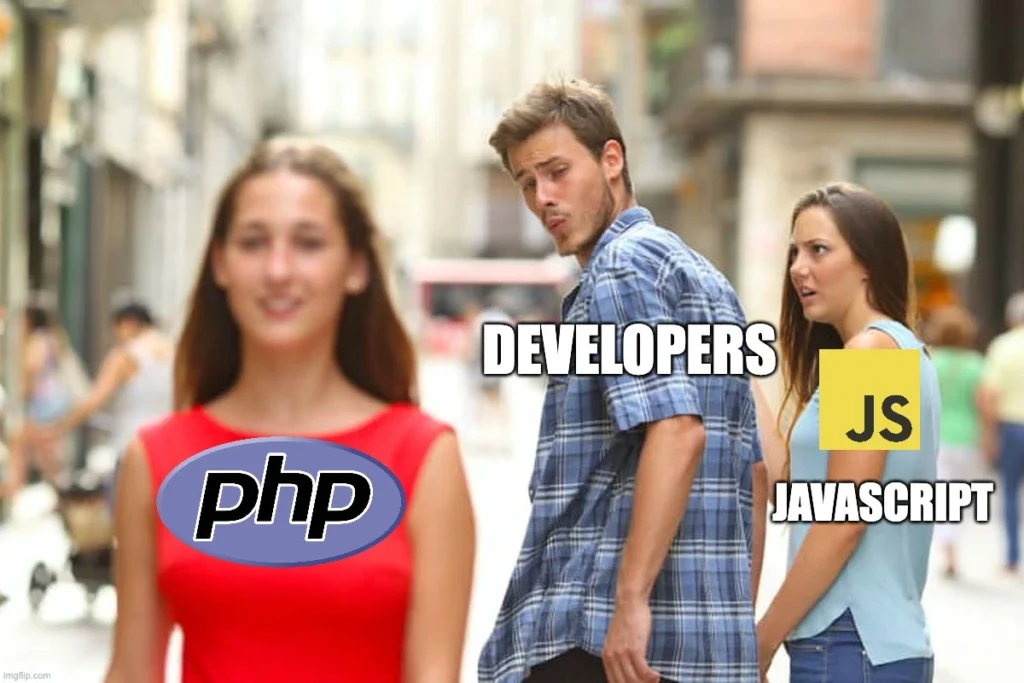
History of PHP
PHP was first used in 1994 as a tool for building personal websites. It was made by Rasmus Lerdorf, a Danish-Canadian programmer. In the early 2000s, it became popular for web servers, and now it is used by 76.2% of websites for server-side programming. One of the popular ones is phpMyAdmin.
Percentages of websites using various server-side programming languages
Eventually, it added new features like object-oriented programming (OOP) in 1998, and performance improved with the Zend Engine II in 2004. In 2015, PHP 7.0 made websites faster with modern features, making PHP far more dynamic for building all kinds of websites. And because of this, the most popular CMSs, like WordPress or Joomla still use PHP.
What is Framework?
A web development framework is a collection of pre-built tools and libraries that help developers build web applications more efficiently and faster.
It provides templates, code snippets, and features like database management and built-in standard security practices to streamline developers’ work.
As the definition says it’s a pack of resources that maintain best practices so developers do not have to worry. But there are a few more advantages besides this.
Advantages of framework
Here are a few advantages of using the framework in web development.
Easy Start: Frameworks come with ready-made templates and tools, so you can kick off your project faster and with less hassle.
Reuse Code: You can reuse code for common tasks, saving time and avoiding repetition.
Better Security: Many frameworks have built-in security to protect against common threats like SQL injection and cross-site scripting.
Simple Fixes: Frameworks often have tools for easier debugging and maintenance, helping you spot and fix issues quickly.
Smooth Performance: They’re optimized to ensure your web apps run efficiently.
Community Help: Popular frameworks have big communities for support, with lots of documentation and plugins.
Grow with Ease: Frameworks help you build scalable apps that can grow as your user base increases.
Consistent Code: They ensure your code stays organized and consistent, which is great for teamwork.
Quick Prototyping: You can rapidly create and test new features.
Easy Database Work: Many frameworks simplify database tasks like querying and managing data.
5 best PHP frameworks
Enough talk about the framework. Now let’s get back to the PHP. We have selected these 5 PHP frameworks by assessing six characteristics.
First hand we look for proper documentation and community support. Then we run benchmarks for speed tests of the frameworks. We use PHP-Frameworks-Bench for this. We look for its pricing and open source availability. Finally, check the modularity and its regular updates.
As per these characteristics we have listed here our top pick with a bonus.
- Laravel
- Symfony
- Yii (Framework)
- CodeIgniter
- Slim
- CakePHP
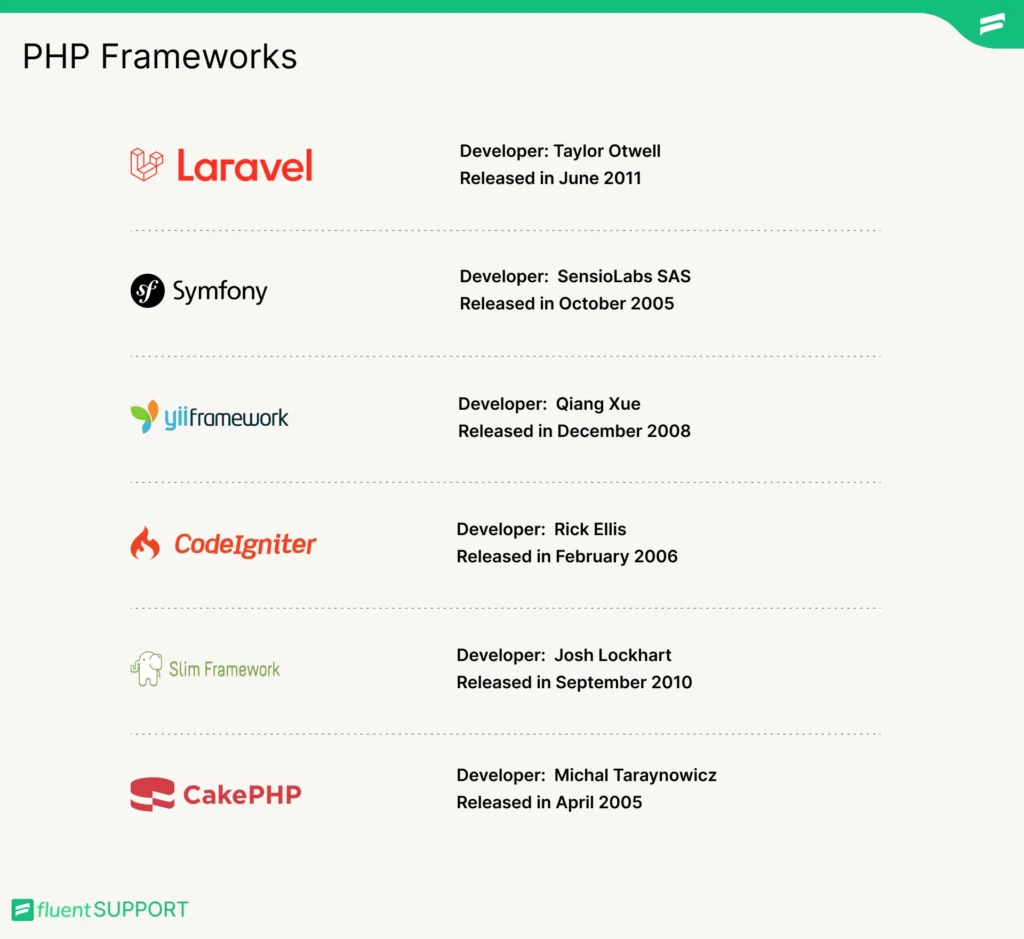
1. Laravel
Laravel is the most powerful and popular PHP frameworks right now. One of the reasons is its developer-friendliness and elegant syntax. It simplifies common web development tasks like routing, authentication, and caching.
This allows developers to focus on building strong and scalable applications. Laravel’s ecosystem includes tools for database management, automated testing, and faster front-end wireframing.
Characteristics of Laravel
- Documentation: Laravel has extensive and clear documentation. It covers everything from basic usage to advanced features step by step. This reduces developers’ learning time and enables faster troubleshooting.
- Community Support: Laravel has a large and active community. There are many resources like forums, tutorials, and third-party packages readily available. This is why you will find any problem’s solution faster.
- Benchmarks: The requests per second (rps) of Laravel is 84.19 and peak memory is 13.06 MB.
- Open Source/Cost: Laravel is open-source and free to use. This makes it accessible for projects of all sizes without any cost.
- Modular Structure: Laravel has a modular structure. Developers can use pre-built and custom packages. This enhances flexibility and reusability in application development on a larger scale.
- Regular Updates: Laravel is frequently updated. It gets new features, performance improvements, and security patches.
Laravel’s clean syntax, robust tools, and supportive community make it a popular choice for building modern web applications as well.
2. Symfony
Symfony is a powerful PHP framework known for its flexibility, scalability, and rich sets of features. It is designed for developers who need an easy and light solution for complex web applications. Symfony maintains best practices, and standardization, and has interoperability of applications.
- Documentation: Symfony provides detailed and well-organized documentation. It’s an easy-to-understand doc, that covers topics from basic usage to advanced techniques step by step.
- Community Support: The framework has a large and active community. Users can find support through forums, user groups, and third-party bundles.
- Benchmarks: The requests per second (rps) is 309.74 and peak memory is 3.77 MB.
- Open Source/Cost: Symfony is open-source and free to use. SensioLabs provides commercial support for projects scale-up.
- Modular Structure: Symfony’s modular design allows developers to combine or create reusable components for consistency.
- Regular Updates: Symfony receives frequent updates with new features, enhancements, and security fixes.
Symfony is an excellent choice for enterprise-level applications and projects with complex demands. Its robustness and big community support make it a futureproofed framework.
3. Yii
Yii is a high-performance PHP framework designed for developing modern web applications. It is popular for its straightforward setup process.
It has the best features like previous ones including caching, authentication, and role-based access control, making it ideal for small and large-scale applications.
- Documentation: It provides comprehensive and clear documentation, including tutorials, guides, and a detailed API reference. This makes it easy for developers to learn and utilize the framework effectively.
- Community Support: It has an active and very supportive community. You’ll find forums, user groups, and numerous third-party extensions to help you solve problems and extend functionality.
- Benchmarks: The requests per second (rps) is 503.76 and the peak memory is 2.56 MB.
- Open Source/Cost: Yii is open-source and free to use, making it accessible for any project without any costs.
- Modular Structure: Developers can build applications using it’s reusable components. These components are easily customizable and can be extended as needed.
- Regular Updates: It stays up-to-date with new features, performance improvements, and security enhancements.
4. CodeIgniter
CodeIgniter is a lightweight PHP frameworks designed for developers who need a simple and elegant toolkit to create featured rich web applications. It offers a minimalistic small footprint and nearly zero configuration making it ideal for developers looking for a hassle-free solution.
- Documentation: CodeIgniter offers clear and concise documentation, including a user guide. This resource covers everything about the framework, making it easy for beginners and experienced developers.
- Community Support: It has an active community with forums, discussion groups, and third-party resources. Developers can find help and share solutions easily.
- Benchmarks: The requests per second (rps) is 302.21 and the peak memory is 3.62 MB.
- Open Source: It is open-source and free to use for developers and businesses.
- Modular Structure: While not as modular as some other frameworks, CodeIgniter has libraries and helpers to extend functionality.
- Regular Updates: It receives regular updates and maintenance, focusing on stability and performance improvements.
CodeIgniter’s simplicity, speed, and ease of use of libraries and helpers is an excellent option for building dynamic and large-scale web applications.
5. Slim
Slim is a micro PHP framework that helps developers quickly build simple yet powerful web applications and APIs. It focuses on being fast and minimalist, offering only essential features, which makes it lightweight and easy to use.
- Documentation: Slim provides straightforward and well-organized documentation.
- Community Support: It has a supportive community with active forums and plenty of tutorials and resources.
- Benchmarks: The requests per second (rps) is 798.17 and the peak memory is 1.57 MB.
- Open Source: Slim is open-source and free to use.
- Modular Structure: Slim’s modular nature allows developers to add the components they need only. This keeps the application light.
- Regular Updates: Slim receives regular updates, ensuring it stays up-to-date with the latest web development practices and security standards.
Slim’s simplicity, speed, and flexibility make it an excellent choice for building lightweight web applications and APIs.
6. CakePHP
CakePHP is a powerful and flexible PHP framework designed to make developing web applications with less code. It follows the Model-View-Controller or MVC pattern.
Characteristics of CakePHP
- Documentation: It provides thorough and detailed documentation, including guides and tutorials.
- Community Support: It has a strong and active community with forums and extensive third-party plugins for support and enhancements.
- Benchmarks: The requests per second (rps) is 243.96 and the peak memory is 4.74 MB.
- Open Source/Cost: CakePHP is open-source and free, supported by an active developer community.
- Modular Structure: CakePHP’s modularity allows developers to use pre-built and custom components for scalable application development.
- Regular Updates: It regularly receives updates with new features, performance improvements, and security patches.
Its ease of use, comprehensive features, and active community make it an excellent choice for developers.
Here is the visual comparison of requests per second (rps) in frameworks. The higher the number is the better.
Final Verdict
Choosing the right PHP framework depends on your project needs, scalability, and developers’ preferences. Laravel and Symfony are great for big projects, thanks to their large community support and tutorials.
Yii and CodeIgniter are lightweight, fast, and simple. It is perfect if you need something simple and quick for small web apps or APIs. CakePHP offers a good mix of simplicity and scalability.
Think about what your project requires and pick the best PHP frameworks that fit best. Each framework has its strengths, you have to devise what serves your project need without being overkill.
Start off with a powerful ticketing system that delivers smooth collaboration right out of the box.





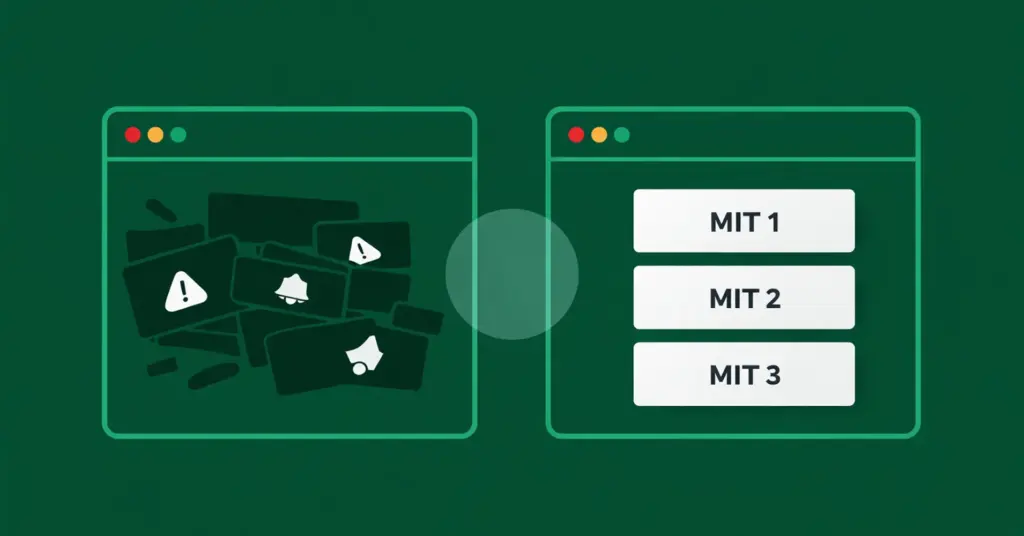





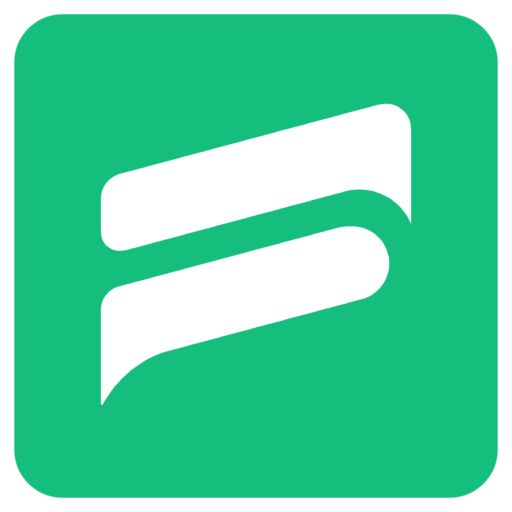
Leave a Reply